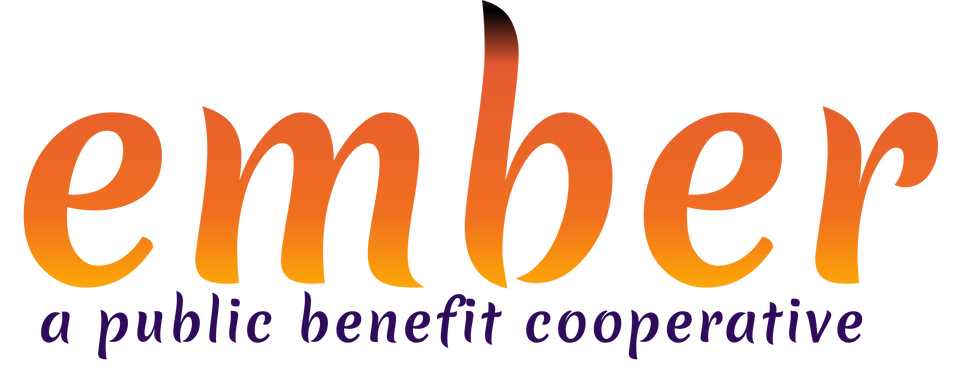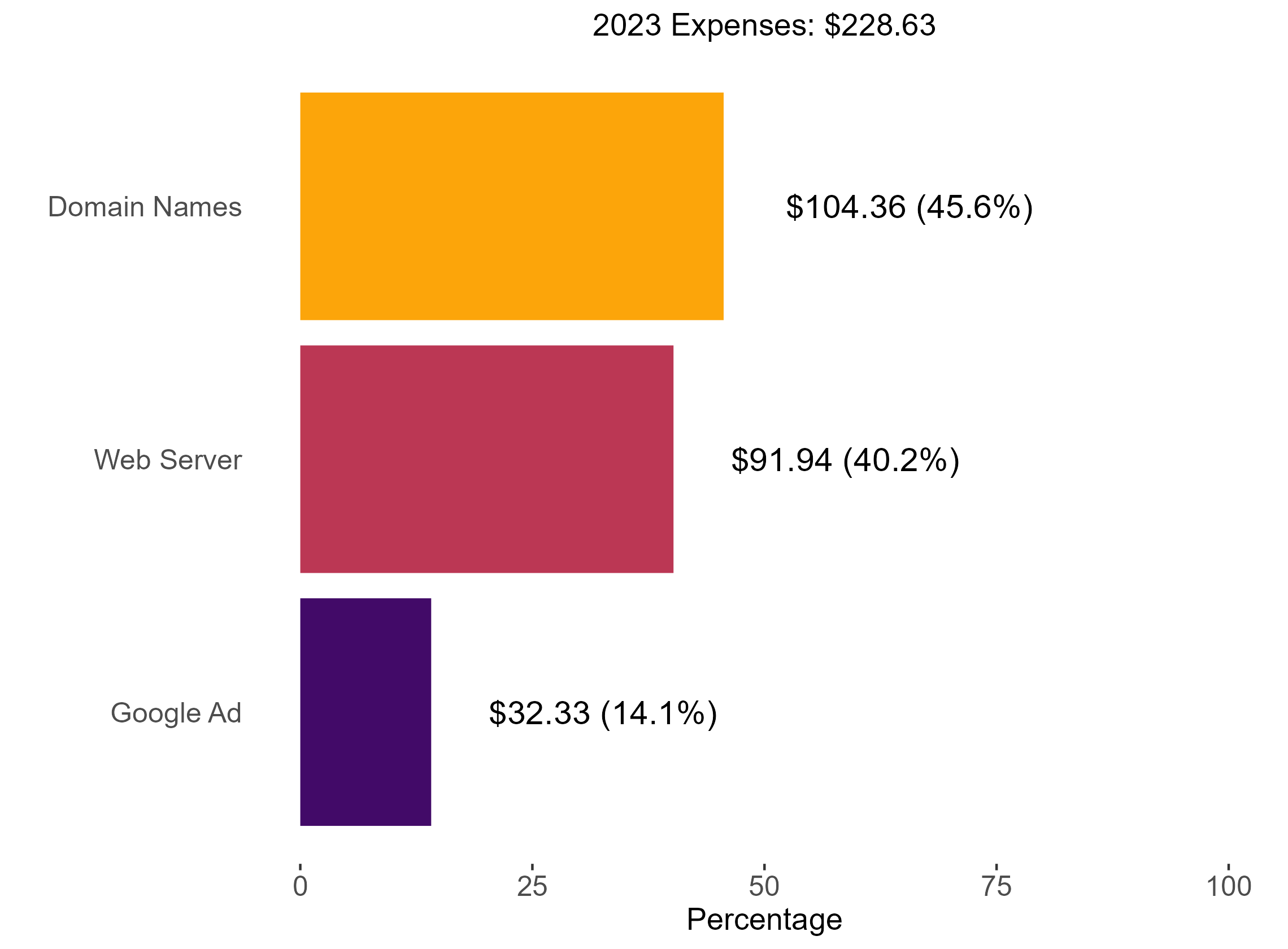Annual Report 2023

Ember was established in Colorado in 2022 as a public benefit corporation organized as a cooperative and operates as a collective using a modified consensus decision process.
We are a think-and-do tank. We wade through frustrating and overwhelming issues to identify and highlight things we can do in our everyday lives to shift norms, to build community, to forge a new social contract for a humane future.
Our general mode of operation is intended to produce four projects per year – one each quarter.
Our public benefit purposes are:
- Forging projects, tools, and platforms for the purpose of supporting agency, dignity, equity, transparency, critical thinking, and fun in a sustainable way
- Fueling cooperatives, other organizations, and individuals with services and expertise, prioritizing the needs of individuals or groups with shared purposes, missions, or values
- Sparking interest in the role and benefits of public benefit businesses, cooperatives, and democracy in the workplace through sharing information about how we conduct our business and practice our values
- Kindling relationships with other businesses and organizations to facilitate the advancement of any of our shared purposes, missions, or values
2023
Public Benefits
- War on
DrugsPeople- Analyzed a frustrating and overwhelming issue – the US War on Drugs – and spotlighted a key dynamic in how the drug war manifests and generates inhumane circumstances: systemic tendencies toward punishment vs. support
- Gathered and wrangled state-level data from multiple sources into a readily usable format for analysts and visualizations for public consumption
- Created an action guide of meaningful things people can do in their everyday lives – actions beyond donating money, signing petitions, and liking on social media – to shift norms and make change on a big, seemingly impossible problem
- Resisted big tech (avoided giving Amazon, Google, et al. our dollars and data) by using open source, small tech solutions (e.g., Nextcloud) and contributed to the small tech ecosystem by submitting bug reports that have led to fixes in updates for all users
- Sparked interest about cooperatives and shifting norms through informal conversations within our networks
Member Benefits
Psychological Benefits:
- Doing something meaningful and purposeful with our time and skills is fulfilling.
- Gaining knowledge through research and developing skills (e.g., tech, interpersonal) through working together is satisfying.
- The flatness and power-sharing of our organization facilitate agency and equity.
- Contributing to a mission- and values-driven thing and growing it is satisfying, particularly of agency needs.
- Our small team structure makes communication and coordination easy.
- The work we do entails creative problem-solving and critical thinking, which is enjoyable to folks like us.
- Fully embracing a sustainability value means members care about each other’s wellbeing and we can trust people are taking on what they can and taking off when they need to.
- There is no interpersonal drama, so weekly meetings are enjoyable.
Technological Benefits: We have all the tools we need, and we do not have to fork over dollars or data to big tech companies like Amazon or Google. We maintain a file server with a suite of productivity and collaboration tools, we have a chat server and email, we have a password manager, and we make our own websites and self-host our blog.
Obstacles
Getting work done:
We took on a sprawling project in one of the more intractable problem spaces of our world and we did not grow our team. We additionally experienced some workflow and remote synchronization barriers. The net result is that we produced a single project for the year, rather than the aspirational quarterly project.
Getting work out:
Obstacles to doing work compound the effect of obstacles to disseminating work in limiting its impact. In addition to simply lacking expertise, or for that matter interest, in mechanisms of media and publicity, we are largely operating in spaces that are not our own and in which we are not recognized experts, which means we lack an established network for getting what we do into people’s heads and hands. And we are operating in ways that go against prevailing norms, which means established operators in those spaces tend to be, at best, indifferent, or at worst, antagonistic toward our work. Being an outsider and doing things differently has advantages. Bringing a fresh perspective to frustrating problems and challenging received wisdom on how to solve them is good. But there are also major disadvantages operating like that, mainly insofar as others noticing and using our work.
Finances
2023 expenses totaled $228.63 and were funded 100% by Founding Members' fees. We spent $104.36 (45.6%) on our domain names (ember.coop, wishlistchallenge.org), $91.94 (40.2%) on maintaining our web server, and $32.33 (14.1%) on a Google advertisement to try and attract attention to our Drug War project while a Drug Policy Alliance conference was happening.

The Future
Constraints
Current constraints remain resource based. We need more brains, skills, funds, and social currency to be successful.
Dreams
- Make better use of our non-non-profit status (e.g., as a coop, not a 501c, we can be as political as we want)
- Recognition as a small but radically different group, pushing boundaries and shifting norms, agitating our opposition
- Form and maintain strong working relationships with other organizations
- Add as many members as our growth structure will allow
- Have measurable benefit in some societal domain and impact on shifting a norm, know people are using our work
- Have fun and make things we are proud of
- Continue what is working and build on it to improve incrementally
Conclusion
This year has made it clear that we need to do things that help develop our identity. We have a mission/vision statement and some values to guide what we do and how we do it. But we have yet to articulate the components of our mission/vision. Strategically doing so through the coming year’s projects will allow us to grow our operations and our operations to have impact. To develop our identity, we specifically need to answer these questions about our why, how, and what.
- Why: to forge a new social contract for a humane future. What does a new social contract look like?
- How: highlight things we can do in our everyday lives to shift norms. What is the framework for meaningful everyday action aimed at shifting norms?
- What: wade through frustrating and overwhelming issues. What are the big problem areas that, if addressed, would generate the most positive change?